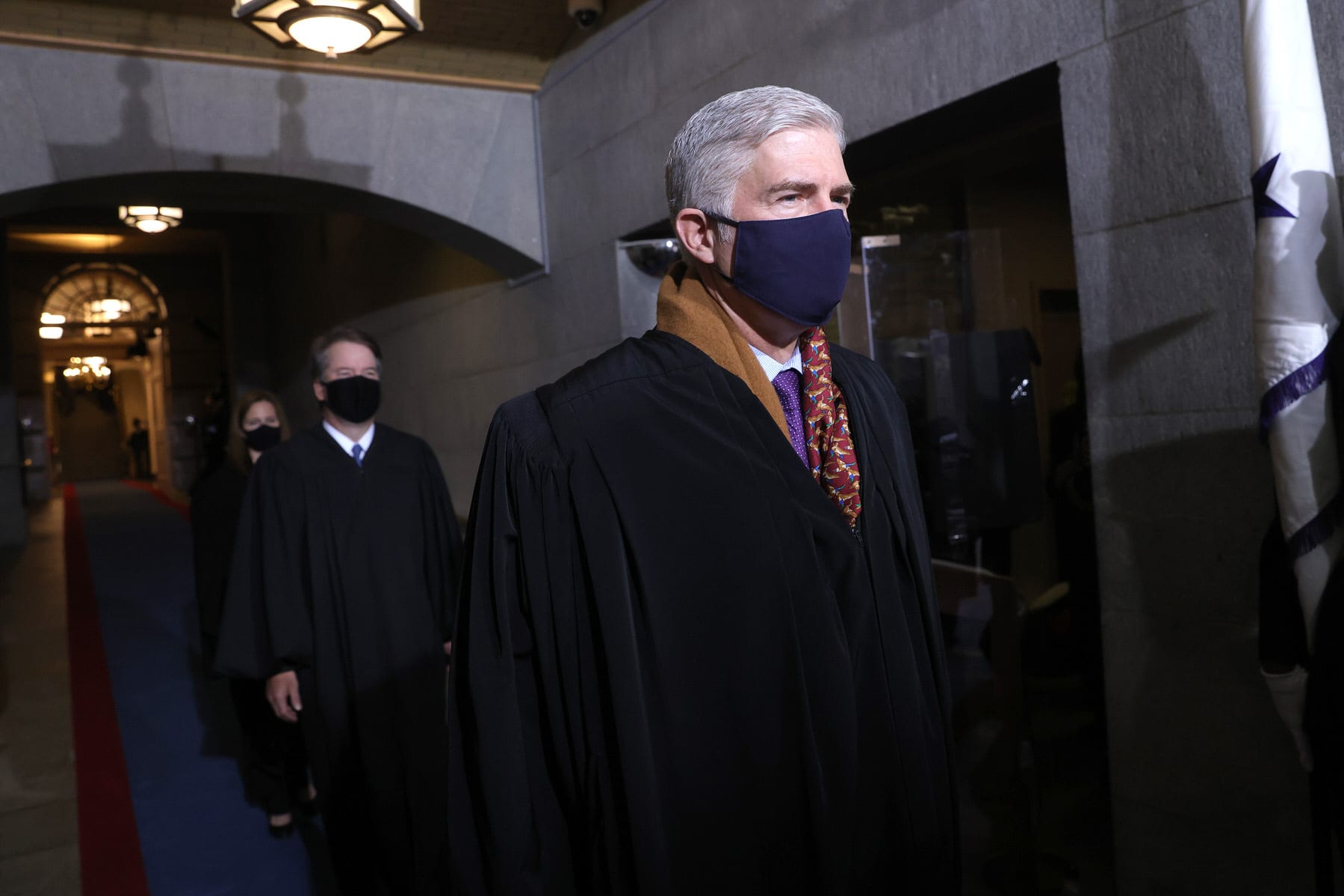The Supreme Court’s decision to preserve a ruling on Gavin Grimm’s right to use the school bathroom is an example of how conservative legal arguments have paved the way for major wins in the LGBTQ+ movement, especially for transgender rights, attorneys tell The 19th.
The role of conservative legal thinking in upholding some transgender protections is emblematic of a philosophical divergence on the American right. Republican lawmakers have pitched a record number of bills restricting whether trans youth can access life-saving, gender-affirming health care and play on school sports teams. Amid all this, a few GOP governors and more seasoned Republican lawmakers have found themselves at odds with their own party over the necessity and morality of the bills, which have sometimes prompted families to relocate.
At the courthouse level, the conclusion of the Grimm case drew from Bostock v. Clayton, a Supreme Court ruling that placed LGBTQ+ people firmly under the protections of Title VII of the Civil Rights Act. As the Court of Appeals for the Fourth Circuit weighed Grimm’s case, the ACLU filed a notice to draw the court’s attention to Bostock.
“Bostock was just the cherry on the top,” Joshua Block, the ACLU’s senior staff attorney, told the 19th. Block said he felt the Court of Appeals would probably still have ruled in Grimm’s favor without the legal support provided by Bostock, but it “certainly made a difference in the Supreme Court not taking the case,” Block said.
The reason that Bostock has staying power as a consequential victory for LGBTQ+ rights is that it uses language that appeals to conservative judges in a majority opinion penned by Justice Neil Gorsuch, said Ezra Ishmael Young, a civil rights attorney and founding board member of the National Trans Bar Association.
“I think Gorsuch was tactically smart,” Young told The 19th. “He wrote Bostock to speak to the people who were most unlikely to follow. I think that is part of why we’ve seen, holistically speaking, pretty wide compliance with Bostock.”
When Gorsuch wrote the court’s 6-3 opinion for Bostock, he wrote: “Those who adopted the Civil Rights Act might not have anticipated their work would lead to this particular result … But the limits of the drafters’ imagination supply no reason to ignore the law’s demands.”
He used precedent set by another famous conservative justice, the late Antonin Scalia, to make his case, Block said.
“A lot of the bad decisions interpreting Title VII to exclude LGBT people were made by courts in the ‘70s and early ‘80s, where it was all based on this idea of, ‘We look to legislative intent and there’s no proof in the legislative record that Congress intended to protect LGBT people,’” Block said.
“And Scalia came to the court and said intent doesn’t matter. We don’t guess about what’s in people’s heads, all that matters is the words that they wrote on paper. And that is exactly what Gorsuch said.”
Gorsuch’s reasoning supported Grimm’s lower-court victory, but the justice’s work has applied differently in other decisions. Most recently, the court declined on Friday to hear an appeal from a Washington state florist who had refused service to a same-sex couple, but Gorsuch was among the minority of justices who wanted to hear the case.
The line of conservative thought that bolstered Grimm’s victory has not been as evident among elected officials, where major Republican voices are still the ones driving anti-trans rhetoric and legislation.
Former President Donald Trump used his platform to push for barring trans women from sports, and state legislation pursuing that goal has been signed by potential 2024 presidential contenders like Govs. Kristi Noem of South Dakota and Ron DeSantis of Florida.
“The sweeping legislative attacks we’re seeing this year are the result of a perfect storm of media misinformation, anti-LGBTQ activism, and a lack of education around trans issues,” GLAAD spokesperson Mary Emily O’Hara said in an emailed statement. “Negative right-wing coverage of trans issues dominates the media landscape.”
Gov. Tate Reeves of Mississippi, before signing his state’s bill to exclude trans girls from sports that match their gender identity, blamed President Joe Biden for forcing the party’s hand on the issue by signing an executive order that extended Bostock’s holding to all federal laws that prohibit sex discrimination, including Title IX — which prohibits sex discrimination in schools.
But the push in statehouses has met some resistance elsewhere as other Republicans take a look at what the government is asking of private citizens.
“Even conservative politicians and governors are not 100 percent on board with the idea that the state should be involved in regulating medical decisions that children are making in the context of their families and with medical advice,” said Alexander Chen, the founding director of the Harvard Law School LGBTQ+ Advocacy Clinic.
Gov. Asa Hutchinson of Arkansas, a Republican who has worked in government for over three decades, vetoed his state’s bill criminalizing gender-affirming care for trans kids, denouncing it as an “extreme” government overreach. (His veto was overturned by legislators.)
Hutchinson did sign two bills barring trans students’ participation in sports. He told Axios that he signed those measures knowing that though no trans student had posed an issue trying to compete, he felt the ramifications of the health bill were real and immediate.
Hutchinson’s willingness to voice his concerns on the health care bill feed into a broader issue worrying some transgender attorneys: Coalition-building with conservatives has been left out of the trans rights movement and the push for LGBTQ+ civil rights as a whole.
Shannon Minter, legal director of the National Center for Lesbian Rights who has been representing LGBTQ+ rights cases for nearly 30 years, believes the movement to some degree has “fallen into positing conservative families as our enemy.”
“We don’t engage, and we just criticize and even demonize people. We really can’t afford to do that here,” Minter said during a conversation in May on the record number of bills targeting trans youth.
Young, who during his postdoctoral program said he read all available recorded cases involving trans people (around 530 cases at the time), lamented LGBTQ+ advocates’ unwillingness to appeal to conservatives — and their tendency to lump all conservative judges in the same boat.
“Not very many people are talking about it. I’d say it’s sort of against most people’s interests to admit it and many people just struggle to see it,” Young said. “A lot of the advocacy organizations, their media mouthpieces, it’s in their interests to scare people about what’s going on because that’s how they get fundraising,” he added.
But the Bostock ruling, coupled with the Supreme Court’s decision not to take up Grimm’s case, will make the landscape more difficult for the state legislatures rallying behind bills targeting trans youth, Carl Charles, a Lambda Legal staff attorney, told the 19th.
“It makes it that much more difficult for them to demonstrate that these state laws that are being passed, or trying to be passed, are anything other than just pure animus,” he said, adding that Lambda Legal and other advocacy groups are actively working on lawsuits against some of the bills that have passed. Those fights will continue despite the Supreme Court’s decision to drop Grimm’s case, he said.
And conversations behind the scenes will continue. Alphonso David, the president of the Human Rights Campaign, stressed to the 19th that his advocacy group is working with elected officials and institutions across the aisle.
“I don’t think it’s accurate to suggest that the work of engaging with those who disagree with us has stopped,” David said. “I don’t think the issue is about engaging conservatives or Republicans or religious leaders — it’s engaging people who don’t see our humanity.”
“And I think as we divide people into different classifications, we lose focus on what our job is. Our job is to make sure that we achieve the civil rights of LGBTQ people, regardless of what label you assign to the person who doesn’t see our humanity.”







